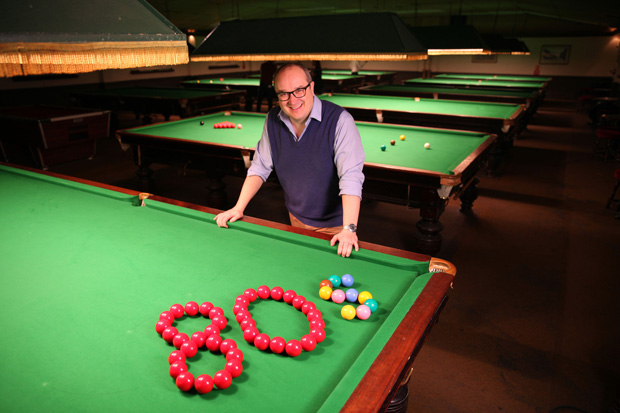Proof that someone has really made it as a TV historian comes, I would suggest, when they join the likes of David Starkey and Simon Schama by getting their name into the programme’s title. So it is that Dominic Sandbrook’s The 70s, from 2012, has now been followed by The 80s with Dominic Sandbrook (BBC2, Thursday), a series that confirms his ability to put across moderately big ideas in a light easy style — and in a parka. Sometimes when watching television, you might be in the mood for a serious history documentary, and sometimes for a show that’ll just wash over you pleasantly. With Sandbrook — and I’m pretty sure I mean this as a compliment — you can have both.
His moderately big idea here is that, while Mrs Thatcher embodied the Eighties ideals of aspiration and individualism, she didn’t create them. Instead that was done by us — with, as Sandbrook somewhat dubiously insisted in last week’s opening episode, a lot of help from the true queen of the decade, Delia Smith.
On Thursday, he continued to prize social history over the political kind, beginning the programme with the game Space Invaders, which caused such alarm among MPs that a parliamentary debate was held on what one called ‘the growing menace of the video arcade’. For my money, this only went to show that almost nothing can become popular among British youngsters without being seen as a terrible threat. (Cf, needless to say, Pokémon Go.) For Sandbrook, though, it was clear evidence of the ‘deep anxiety running through the heart of the decade’.
Such anxiety, much-mentioned throughout the rest of the programme, did provide a useful peg for whatever Sandbrook wanted to tell us about. But it also drew attention to the series’ main weakness: his determination to claim more or less any social trend of the time — including the fear of change and the love of American culture — as something unique to the 1980s, rather than say, part of British life for as long as anyone can remember. (It might also be that some issues weren’t as neatly resolved back then as he thought. ‘In the Eighties,’ he declared in a peroration presumably recorded before 23 June, ‘we at last understood that the days of splendid isolation were over.’)
Still, there’s no denying that the decade did provide plenty of fear-inducing changes for him to chew on, as he went about the skilful business of processing nostalgia into genuine history. There’s no denying, either, how deftly he moves from one subject to another. Perhaps nothing on Thursday quite matched last week’s seamless transition from the New Romantics to the SDP via football hooliganism and snooker. Nonetheless, a lesser presenter might well have paused before going straight from video nasties to the miners’ strike with a single sentence about the collision between technological change and the security of family and community — or, more questionably, from the rise of McDonald’s to Aids by pointing out that not all global imports were equally welcome.
Mind you, on the plus side, this dextrous use of the shameless link does allow him to make his unhurried way through an awful lot of material, by no means all of it as familiar as you might expect. Certainly, I’d forgotten that those nasties had their brief time in the sun not only because there was no censorship on home viewing, but also because Hollywood was initially unwilling to release films on video. And once the censors had been called in, Sandbrook showed us some memorable footage of them in action — mostly peering at screens in some puzzlement. (‘Steve, what do I class this as?’ asked one young woman in specs. ‘It’s masturbation,’ Steve explained. ‘Classify it in the miscellaneous section.’)
Meanwhile, one person who’ll definitely have enjoyed the programme was Norman Fowler, whom Sandbrook unexpectedly described as one of the heroes of the decade for his response to the Aids crisis. And just to prove it, any film of Fowler so much as walking about was accompanied by Bonnie Tyler’s ‘Holding Out For A Hero’.
Not, incidentally, that this was the strangest use of Eighties music in Thursday’s episode. On the whole, it did manage to avoid the grossest clichés — so that, for the first time in living memory, the miners’ strike wasn’t an instant cue for ‘Two Tribes’ by Frankie Goes to Hollywood. Even so, I’m not sure about the Pet Shop Boys’ ‘What Have I Done To Deserve This?’ for Aids, or Talk Talk’s ‘Such A Shame’ for the Brighton bomb. More peculiar still, Sandbrook ended the Falklands War section with a frankly Churchillian piece to camera about how ‘we’d rediscovered patriotic pride, a warrior nation renewed in battle’ — at which point the soundtrack cut to Nik Kershaw’s ‘Wouldn’t It Be Good’.






Comments